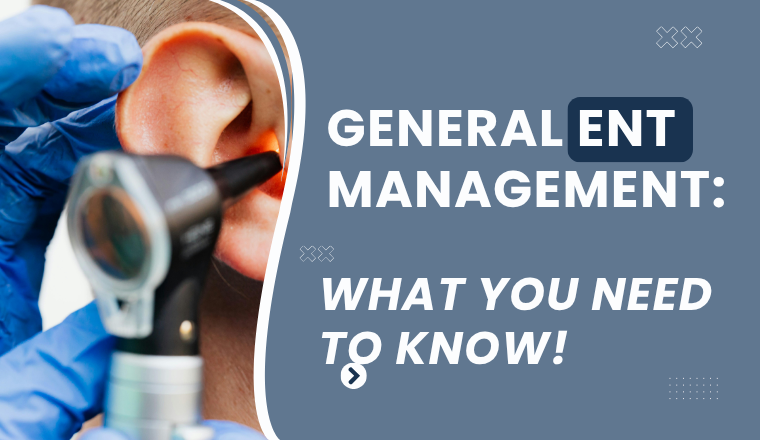Ear, Nose, and Throat (ENT) conditions are some of the most common health concerns affecting people of all ages. From a simple sore throat to chronic sinus infections or hearing loss, ENT issues can significantly impact quality of life. Proper management and timely care can prevent complications and ensure faster recovery.
This blog explores the basics of general ENT management, common conditions, when to see a specialist, and how to maintain ENT health.
What is ENT?
ENT stands for Ear, Nose, and Throat, and is also known as Otolaryngology. This branch of medicine focuses on the diagnosis and treatment of disorders affecting these areas, as well as related structures of the head and neck.
ENT specialists, or otolaryngologists, manage a wide range of conditions, including:
- Ear problems: Hearing loss, ear infections, balance disorders, tinnitus (ringing in the ears)
- Nose problems: Sinusitis, nasal congestion, allergies, polyps, smell disorders
- Throat problems: Sore throat, tonsillitis, voice issues, swallowing difficulties
- Head and neck: Thyroid disorders, neck masses, salivary gland issues, and some cancers
Common ENT Conditions & Their Management
1. Ear Infections
Common in children but can affect adults too. Symptoms include ear pain, fluid drainage, and temporary hearing loss. Treatment often includes antibiotics or ear drops, and in recurrent cases, surgical insertion of ear tubes.
2. Sinusitis
Caused by inflammation or infection of the sinuses. Symptoms include facial pain, congestion, and headache. Management ranges from nasal sprays and antihistamines to sinus surgery in chronic cases.
3. Tonsillitis and Sore Throat
Often viral but can be bacterial (like strep throat). Management includes rest, fluids, and antibiotics if bacterial. Recurrent tonsillitis may require surgical removal (tonsillectomy).
4. Hearing Loss
Can be due to aging, infection, wax buildup, or noise exposure. Management includes hearing aids, ear cleaning, or surgical options depending on the cause.
5. Allergic Rhinitis
Triggered by allergens like pollen or dust. Symptoms include sneezing, runny nose, and itchy eyes. Treatment includes antihistamines, nasal steroids, and avoiding triggers.
When to See an ENT Specialist
You should consult an ENT specialist if you experience:
- Persistent ear pain or hearing issues
- Frequent sinus infections or nasal blockage
- Chronic sore throat or hoarseness lasting more than 2 weeks
- Difficulty swallowing or breathing
- Snoring or sleep apnea symptoms
- Neck lumps or swelling
Early diagnosis helps prevent complications and improves outcomes, especially for issues like hearing loss or head and neck cancers.
General ENT Care Tips
To maintain optimal ENT health, consider the following:
- Keep ears clean but avoid inserting cotton buds or sharp objects
- Stay hydrated to keep mucous membranes moist
- Use a humidifier in dry environments
- Avoid loud noises and use ear protection when needed
- Practice good hand hygiene to prevent infections
- Manage allergies with the help of a specialist
- Avoid smoking, which irritates the airways and increases ENT problems
Importance of Regular Check-ups
Some ENT issues develop gradually and may go unnoticed until they become severe. Regular check-ups with an ENT specialist are especially important for individuals with:
- History of ear or sinus infections
- Allergies or asthma
- Exposure to loud environments
- Family history of ENT-related cancers
Early intervention can save you from chronic discomfort and unnecessary procedures.
FAQs on General ENT Management
1. How can I tell if my child needs to see an ENT doctor?
If your child has frequent ear infections, speech delays, trouble hearing, snoring, or enlarged tonsils, it’s a good idea to consult an ENT specialist.
2. Are ENT issues always treated with surgery?
No. Many ENT conditions are managed with medications, lifestyle changes, or minor procedures. Surgery is typically reserved for chronic or severe cases.
3. Can allergies cause ENT problems?
Yes. Allergies often affect the nose and sinuses, leading to congestion, post-nasal drip, and sinus infections. ENT doctors often work closely with allergy specialists for comprehensive care.
4. How can I prevent ear infections?
Practice good hygiene, avoid smoke exposure, and ensure proper ear care. In children, breastfeeding and avoiding bottle-feeding while lying down may help reduce the risk.
5. Is hoarseness a serious issue?
Temporary hoarseness from a cold is usually harmless. However, if it lasts more than two weeks, especially without other cold symptoms, it should be evaluated by an ENT specialist.
